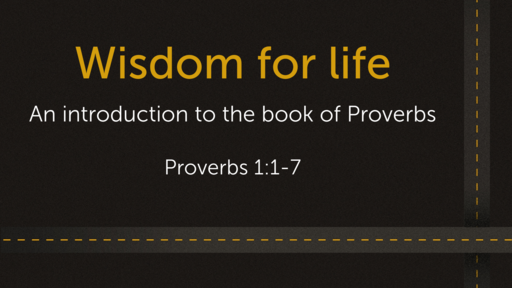Wisdom for life - An introduction to the book of Proverbs

Proverbs is a difficult book, full of contradictions, puzzles and straightforward no-brainers. How should a Christian treat this ancient collection of wisdom? Does it have any value for us in the distant 21st Century, almost three millenia removed from its origins? Join us as we introduce our study on Proverbs, wisdom for life.
Introduction
What is wisdom?
Sources of wisdom
Bible
Who can become wise?
How do you become wise?
Wisdom, then, is not a matter of memorizing proverbs and applying them mechanically and absolutely. Wisdom is knowing the right time and the right circumstance to apply the right principle to the right person.
Returning to the “contradictory” proverbs about whether or not to answer a fool (Prov 26:4–5), we see now that the wise person must, to put it baldly, know what kind of fool he or she is dealing with. Is this a fool who will not learn and will simply sap time and energy from the wise person? If so, then don’t bother answering. However, if this is a fool who can learn, and our not answering will lead to worse problems, then by all means, answer.
In a word, proverbs are principles that are generally true, not immutable laws. Bearing this in mind makes a world of difference when reading the proverbs. Someone reading Proverbs 23:13–14 from the New King James Bible, and having a mechanical view of the application of the proverbs, may well end up with a dangerous view of parenting:
Do not withhold correction from a child,
For if you beat him with a rod, he will not die.
You shall beat him with a rod,
And deliver his soul from hell. (NKJV)
Taken as a law, this would lead to parents beating their child out of fear that otherwise the child would end up in the fire and brimstone of hell. Indeed, a literalist would say that only a rod will do; that spanking with the hand is not permissible.
But this is not a law. It is a general principle that encourages those who are reluctant to use a form of discipline by telling them that it is permissible and even helpful for delivering a child from behavior that may result in premature death. As with the fool in the earlier example, though, one must know what kind of child one is dealing with. Some children won’t respond at all to physical punishment; indeed, it may hasten their path to the grave. Others may not need physical punishment but simply a strong reprimand. The key is that parents must know their child and the situation as they apply any proverb.
Proverbs are situation-sensitive. We must not apply them mechanically or absolutely. Experience, observation, instruction, learning from mistakes and, most importantly, revelation—all these lay the groundwork for reading the text, reading people, and reading the situation. This understanding of Proverbs will become even more apparent in chapter seven, where we look at the gross misappropriation of wisdom sayings in the book of Job.
